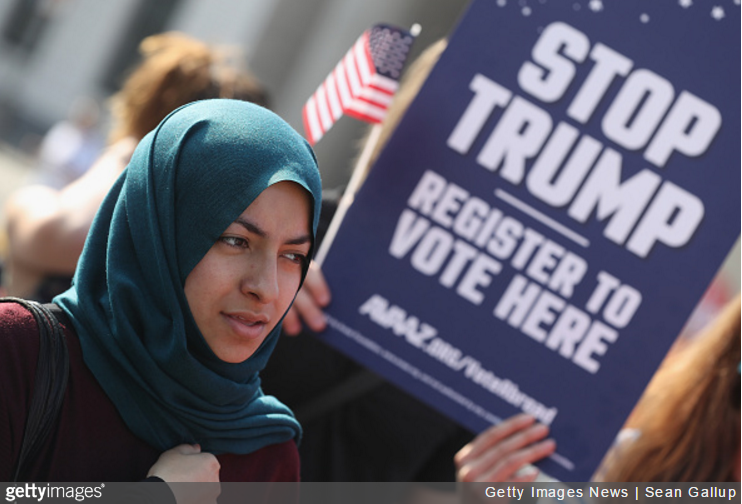With last week’s election of Donald Trump as U.S. president, the anxiety of Arab and Muslim Americans was perhaps the timeliest topic of discussion at the tenth annual Harvard Arab Weekend.
In a panel on Saturday, entitled “Arab and Muslim America: Facing Today’s Challenges,” four activists and professors spoke passionately on the renewed need to fight back against Islamophobia and advocate for the rights of Arab and Muslim Americans in the United States.
“This topic has never been more relevant than it is now with the outcome of the presidential elections,” said Nour Soubani, a master’s student at Harvard’s Center for Middle Eastern Studies and the organizer of the panel.
“Not only has the president-elect’s campaign contributed to the Islamophobia and xenophobia in the US, but there have been specific policy proposals – like the Muslim ban or ID cards – that, even if they don’t happen outright, make it important to recognize the challenges that lie ahead for the Muslim American community.”
‘We didn’t laugh when everyone else laughed’
Dalia Fahmy, an assistant professor of political science at Long Island University Brooklyn, began the discussion by lamenting the purely economic framework through which Americans have been encouraged to understand the election’s outcome. She argued that Americans are now being told to sympathize with what she described as “white rage,” despite the fact that Americans have never been told in the past to sympathize with the anger of marginalized racial and religious minorities.
White Americans, Fahmy added, had the privilege of not taking the threat of Donald Trump seriously during much of the election cycle. But Arab and Muslim Americans were forced to do so from the beginning. “We didn’t laugh when everyone else laughed,” Fahmy remarked.
‘Intersectional hatred’
In response to Trump’s election, Khaled Beydoun, assistant professor of law at the University of Detroit, urged Arab and Muslim Americans to reject the narrative of their “whiteness.” Instead, he argued, they should stand with other minority groups hurt by Trump’s “intersectional racism” and “intersectional hatred” – including Latinos, African-Americans, LGBT people, and women – in order to organize and build coalitions.
The ‘apologist’ role
Shannon Erwin is the executive director of the Muslim Justice League, an organization that fights to defend the rights of Muslim Americans under the pretext of national security threats. Erwin reminded the audience that while Trump and his supporters pose an unprecedented threat to the dignity and safety of Muslim Americans, the Obama Administration is also responsible for discriminatory policies.
She was referring specifically to a federal pilot program called “Countering Violent Extremism,” which has been launched in three cities: Boston, Los Angeles, and Minneapolis. Erwin claimed that the program targets educators and providers of healthcare and social services in Boston, asking them to report on fellow Muslims whom they considered vulnerable to extremist ideologies. Those reported on are then subjected to a “moderating treatment,” in which they are exposed to “liberal values” in an attempt to shape them into “acceptable Muslims,” in Erwin’s words.
Along with the other panelists, Erwin urged Muslim Americans to reject the narrative of “moderate Islam,” which divides Muslim Americans into “good Muslims” and “bad Muslims,” as fits the needs of the national security apparatus. She argued that this framework has forced many Muslims into “apologist” roles, making them defend and explain themselves in a way that no other religious group in the United States must do.
Subtle steps?
Finally, John Robbins, the executive director of the Massachusetts Chapter of the Council on American Islamic Relations (CAIR), pressed the audience to beware of the smaller, more incremental actions that President-elect Trump and his administration might take to infringe upon the rights of Arab and Muslim Americans. He warned that Trump is known for making big, outrageous threats, but once he is actually in office, he may inflict damage in more subtle ways.
The large audience drawn by the panel clearly reflected the worries held by many Arab and Muslim Americans at the conference. While no one knows exactly what actions Trump will take as president, his extreme proposals – including a ban on all Muslims entering the United States, and requiring Muslims already in the US to possess a special form of identification – are not being taken lightly by those who would be affected.
